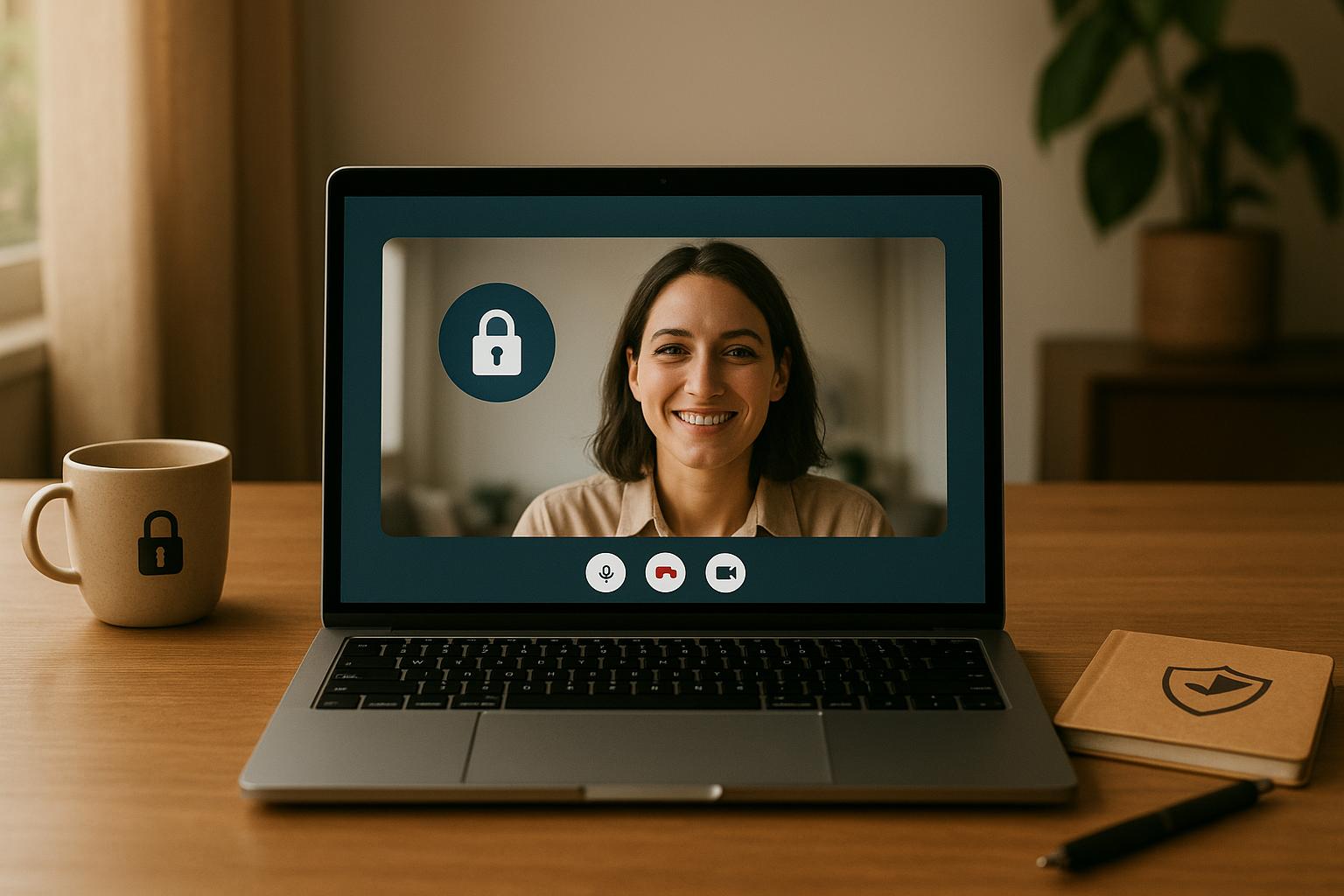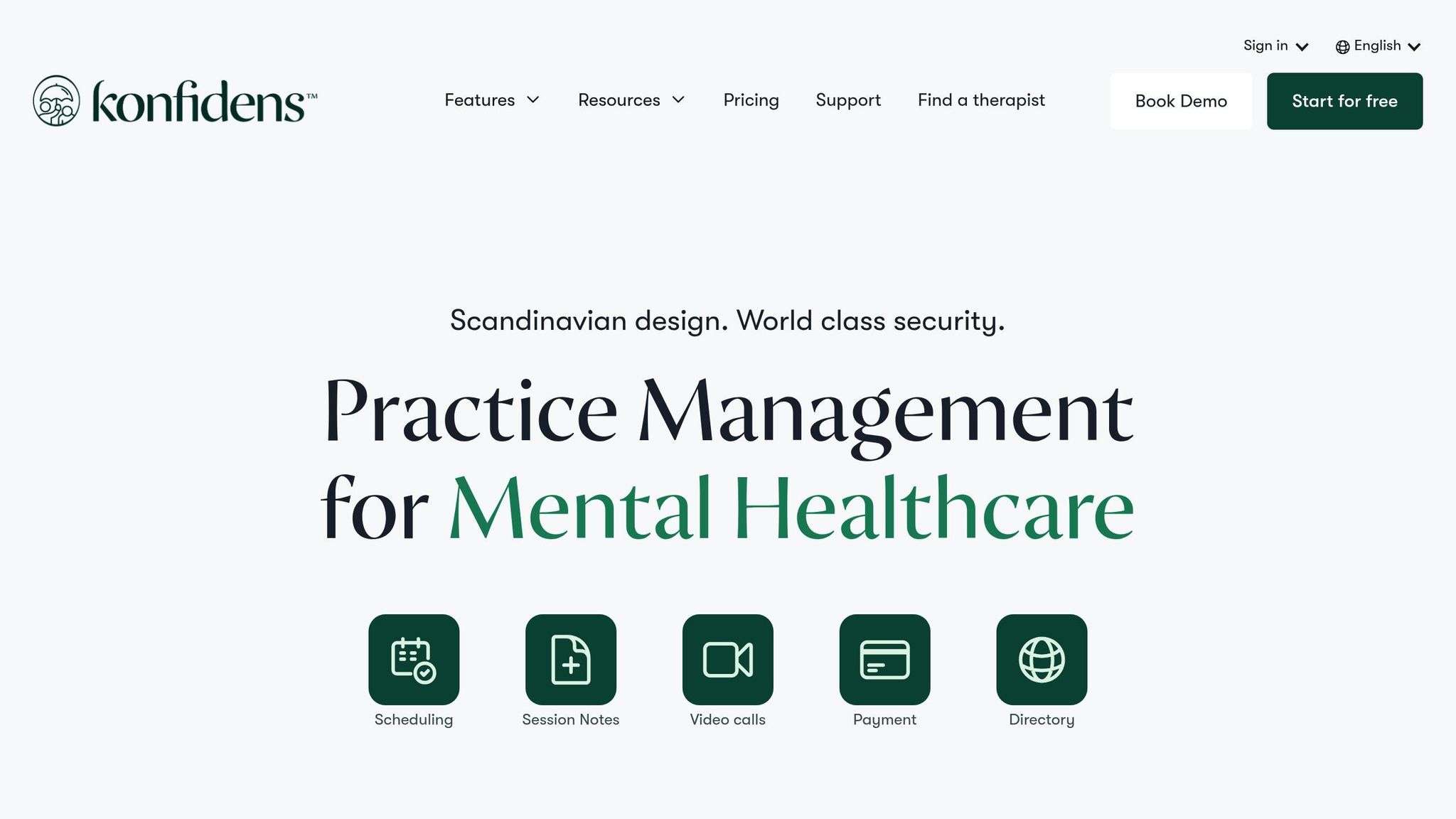How to Choose a GDPR-Compliant Video Platform
Learn how to select a GDPR-compliant video platform for therapy, ensuring client data security and trust while meeting regulatory standards.

Protecting client data is non-negotiable for UK therapists. GDPR compliance ensures sensitive information shared during therapy sessions is secure, maintaining trust and avoiding legal penalties. Choosing the right video platform is essential for safeguarding client data while meeting regulatory standards.
Key Takeaways:
- GDPR Basics: Platforms must follow strict principles like data minimisation, purpose limitation, and accountability.
- Security Features: End-to-end encryption, multi-factor authentication, and secure data storage are critical.
- Data Handling: Platforms should store data within the EU or provide robust safeguards for international transfers.
- Privacy Tools: Consent management, data retention policies, and clear privacy notices are must-haves.
- Usability: Look for easy integration with your tools, reliable performance, and accessibility features.
Konfidens is a tailored option for UK therapists, offering secure video calls, EU-based data storage, and practice management tools. Plans start at £19.00/month (ex. VAT), making it a practical choice for professionals.
GDPR compliance isn't just about avoiding fines - it's about protecting your clients and your reputation. Choose a platform that prioritises security, privacy, and ease of use.
GDPR Requirements for Video Platforms
Understanding GDPR requirements is crucial when selecting secure video platforms for therapy. These regulations are designed to safeguard your clients' sensitive information during virtual sessions.
Key GDPR Principles for Data Protection
GDPR governs video, audio, and data transmissions to ensure privacy and security [3]. Three main principles underpin compliant video platforms: data minimisation, purpose limitation, and accountability [4].
- Data minimisation: Platforms must only collect the data necessary for secure therapy sessions.
- Purpose limitation: Personal data should only be gathered for clear, specific purposes. Platforms must explain why they process client data and restrict its use to those purposes unless additional consent or a new legal basis is secured.
- Accountability: Both you and the platform provider share the responsibility of demonstrating GDPR compliance. This includes maintaining records, implementing strong security measures, and showing adherence to the regulations.
The stakes are high - violations can result in penalties of up to €20 million or 4% of annual revenue [4]. With many UK professionals attending over five virtual meetings daily, adding up to 25 meetings a week [4], the sheer volume of data being processed makes compliance even more critical.
Essential security features for video platforms include password protection, waiting rooms, meeting locks, and end-to-end encryption [4]. Platforms should also incorporate data protection by design, receive regular security updates, and store recordings securely, limiting access to authorised personnel [1].
"GDPR compliance is a non-negotiable for companies operating in Europe or handling the data of European citizens." [2] - Jordan Owens
To enhance compliance, platforms should conduct a Data Protection Impact Assessment to address privacy risks effectively.
Data Protection Impact Assessment (DPIA)
A Data Protection Impact Assessment (DPIA) is required under GDPR for processing activities that pose high risks to individuals' privacy rights [5]. For video platforms used in therapy - where highly sensitive data is handled - a DPIA is essential.
DPIAs should be prepared during the planning phase of new data processing activities [6]. Key components include:
- A detailed description of the data processing activities.
- An assessment of necessity and proportionality.
- Identification of risks and measures to mitigate them.
- Comprehensive documentation of findings [7].
When assessing a video platform, request documentation or an overview of their DPIA process. A transparent DPIA approach signals a responsible provider. Additionally, check if the platform has a Data Protection Officer (DPO), as consulting with a DPO can help address compliance challenges. Reviewing the platform’s privacy policy, third-party certifications, and data breach response plans also demonstrates its commitment to strong data protection practices.
In addition to DPIAs, establishing a clear legal basis for processing data is a critical step.
Legal Basis for Data Processing
Under GDPR, every piece of client data processed through a video platform must have a valid legal basis [8]. Data controllers must identify this legal basis before processing begins, as it directly impacts individual rights, such as data portability, which applies when the legal basis is consent or a contract [8].
Documenting the chosen legal basis is vital, as changing it later can undermine transparency and fairness [9]. A privacy notice should clearly outline the lawful basis for processing and the intended purposes [9].
For therapy sessions, obtaining clear, informed consent from clients is essential. This includes ensuring clients are notified and give explicit consent before any session is recorded or stored. The video platform should make it easy to inform participants and secure their consent [1].
When processing special category data - such as sensitive health information discussed during therapy sessions - GDPR requires both a lawful basis and an additional condition under Article 9 [9][10]. This dual requirement highlights the importance of using platforms that respect the sensitive nature of therapeutic communications.
Platforms should also provide users with tools to access, correct, or delete their recorded content, as required by GDPR [1]. For international data transfers, companies must justify the transfers with legitimate reasons and prioritise platforms offering hosting options within Europe or through sovereign clouds [2].
Required Features for GDPR-Compliant Video Platforms
When choosing a video platform for therapy sessions, prioritising technical features and security measures is essential to meet GDPR standards. These safeguards not only protect your clients' sensitive information but also help you avoid hefty penalties. These features ensure your practice maintains high standards for client data protection.
Data Security and Encryption Standards
End-to-end encryption is a must for any GDPR-compliant video platform. According to Article 32 of the GDPR, encryption is highlighted as a key technical and organisational measure to ensure adequate data security levels [13]. This means data must be encrypted both when stored and during transmission [13].
The platform should support AES (Advanced Encryption Standard) with either 128-bit or 256-bit keys. AES-128 offers faster performance, while AES-256 provides a higher level of security [11]. For real-time therapy sessions, platforms using SRTP (Secure Real-Time Transport Protocol) are ideal, as it ensures encryption, message authentication, and replay protection [12].
"GDPR does not specifically mandate any particular level of encryption or any other specific technical standard because they may become obsolete quickly due to technological change." [13] - Rupert Brown, CTO and Founder at Evidology Systems
In addition to basic encryption, platforms should employ TLS (Transport Layer Security) to protect communications between clients and servers [12]. For recorded sessions, HLS (HTTP Live Streaming) encryption ensures video segments remain secure during storage and playback [11].
Multi-factor authentication (MFA) is another critical feature, as it prevents unauthorised access. Detailed audit trails are equally important for demonstrating compliance. Together with strong encryption, proper data storage and transfer practices are essential for GDPR adherence.
Data Storage and Transfer Compliance
While GDPR does not mandate that all data from EU residents remain within EU borders, it places a strong emphasis on safeguarding international data transfers [14]. Personal data should only be transferred to countries that ensure an "adequate" level of protection comparable to EU standards [15].
Platforms offering EU-based data centres simplify compliance by eliminating many of the complexities tied to international transfers. Conducting a data mapping exercise helps you understand where your clients' data is stored and processed [15].
For platforms that transfer data internationally, it’s crucial to implement appropriate safeguards. The EU-U.S. Data Privacy Framework, effective from July 2023, governs personal data transfers from EU individuals to U.S. organisations that align with GDPR-compliant practices [1]. However, opting for EU-based data storage remains the simplest route.
Look for platforms that either operate EU-based data centres or provide clear, documented safeguards for international transfers. These should include encryption, access controls, and compliance with data residency requirements [15].
Privacy and Usability Features
In addition to technical security, privacy-focused tools ensure therapy sessions remain confidential while meeting GDPR standards. These features should strike a balance between robust security and ease of use, enabling secure and seamless therapy experiences.
Granular consent management is vital, allowing clients to explicitly approve each data processing purpose and withdraw consent when needed. This is especially significant, as 91% of people report greater trust in companies that clearly communicate their GDPR compliance [17].
Key privacy features include automated data retention policies that delete recordings and session data after a defined period. Platforms should provide both automated deletion workflows and manual options to address the "right to erasure" [17].
Data minimisation features ensure only essential information is collected, supported by purpose-driven settings and adjustable retention periods [17]. Secure sharing options, such as password-protected links with time-limited access, help maintain confidentiality while preventing unauthorised viewing [16].
Additionally, data subject rights management tools simplify handling client requests for data access, correction, or portability, helping you meet GDPR deadlines [17]. Transparent privacy policies and clear data handling practices further build trust by outlining what data is collected, how it is used, and where it is stored [16]. Platforms should also provide documentation to support privacy impact assessments, detailing data processing activities, security measures, and risk mitigation strategies [17].
How to Choose the Right Platform
Choosing a GDPR-compliant video platform is no small task. To make the right choice, you’ll need to carefully evaluate security, usability, and compliance. These factors ensure the platform meets your practice’s requirements while safeguarding your clients’ sensitive information.
Check GDPR Compliance
Start by reviewing the platform’s GDPR credentials. Request their data processing agreements (DPAs) to understand how they handle data. Under GDPR, organisations must actively manage security risks and have clear plans to address them [18].
Ensure the platform has robust measures for obtaining explicit client consent before collecting any data [18]. Also, check for age verification systems, as GDPR restricts data processing for individuals under 16 years of age without proper consent [18].
Find out if the platform requires you to appoint a Data Protection Officer (DPO) and whether they provide tools or guidance for this responsibility [19]. Some platforms even include built-in features to help you manage compliance across your practice [19].
Another critical area is third-party risk assessment. Confirm the platform transparently discloses any external services that might process your clients’ data [18]. A clear, documented approach to third-party risks is essential for maintaining a secure and compliant system.
Test Usability and Integration
While compliance is vital, the platform also needs to work seamlessly in your day-to-day operations. Request a trial period to explore its interface and features [23]. A platform with a steep learning curve can disrupt therapy sessions, so ease of use is key [25].
Test the platform’s reliability by conducting video calls at different times. Stable connections are critical for uninterrupted sessions and maintaining a strong therapeutic relationship [21]. Frequent disruptions or poor video quality can harm the therapy experience.
Consider how well the platform integrates with your existing tools, such as electronic health records (EHRs) or scheduling systems. Direct synchronisation can save time and reduce the hassle of manual data entry [24].
Look for customisation options that let you adapt the platform to your practice’s needs. This might include adjusting video quality, modifying user interfaces, or setting specific data retention periods [23]. Accessibility is another important factor - ensure the platform supports clients with disabilities, offering features like screen readers or alternative communication methods [23].
Finally, review the training and support resources available. Platforms with detailed documentation, tutorials, and responsive customer service can make onboarding smoother for both you and your clients [22].
Review Security and Data Handling
Once you’ve assessed compliance and usability, dive into the platform’s security features. Confirm that it uses encryption for data both in transit and at rest, and check for clear documentation of its encryption standards and key management practices.
Examine the platform’s access control mechanisms to ensure role-based permissions are in place. This is especially important if multiple staff members need varying levels of access [16].
Check for audit trail capabilities - detailed logs that track who accessed or modified data, when, and why. These logs are crucial for demonstrating compliance during inspections or investigating security issues [16].
Review the platform’s data retention and deletion policies. It should allow you to manage data retention periods and respond to clients’ "right to erasure" requests efficiently [16]. Additionally, verify whether the platform offers data residency options, such as storing video data within the UK or EU, to simplify compliance with GDPR’s territorial rules [16].
Investigate the platform’s incident response procedures. They should have a clear plan for notifying authorities and affected users in the event of a data breach, as required by GDPR [20].
Finally, confirm that the platform includes secure sharing features like password-protected links and time-limited access. These tools help ensure sensitive therapeutic content remains confidential and is only viewed by authorised individuals [16].
sbb-itb-0b4edca
Konfidens: A GDPR-Compliant Solution for UK Therapists

For therapists in the UK, ensuring GDPR compliance while managing their private practice can be a challenge. Konfidens offers a tailored solution that combines secure video conferencing with a comprehensive suite of practice management tools. Designed specifically for private practitioners, it prioritises both regulatory compliance and operational ease, making it a reliable choice for therapists.
How Konfidens Ensures GDPR Compliance
Konfidens places a strong emphasis on data security, implementing measures that align with - and often exceed - GDPR standards. A standout feature is its encrypted, peer-to-peer video calling system. According to the platform: "Konfidens' video calls are encrypted and done peer-to-peer – meaning no servers are involved. For added security, a unique URL is created for each call" [26]. This design ensures that therapeutic conversations remain private and protected from unauthorised access.
In addition, all client data is stored on servers located within the EU, adhering to GDPR's strict data residency rules. This setup also complies with Norwegian health regulations, offering an extra layer of security for sensitive information [27].
Comprehensive Practice Management Tools
Konfidens goes beyond secure communication by offering a range of tools that simplify practice management. These include scheduling systems, secure session notes, online booking, payment processing, and automated reminders [27]. The platform caters to practitioners at different stages of their career:
- Free Plan: Supports up to three clients, making it perfect for those just starting out.
- Solo Plan: Costs £19.00 per month (ex. VAT) and includes unlimited appointments for up to 20 active clients.
- Pro Plan: Priced at £29.00 per month per user (ex. VAT), it supports unlimited clients and offers additional clinic management features [27].
Konfidens is designed to scale with your needs, whether you're a solo therapist or managing a larger clinic. Features like custom note templates, recurring appointments, and therapist directory profiles help build and maintain a thriving practice [28]. The integrated payment system further simplifies financial management while maintaining security and compliance.
Boosting Efficiency for Therapists
Konfidens shows that adhering to GDPR doesn't have to complicate practice management. In fact, it can make things smoother. Tom B., a psychotherapist, shared how the platform has transformed his workflow: "Konfidens reduces the time we spend on administration by 80 to 90 percent!" [28]. By consolidating client records, notes, appointments, and payments into one platform, Konfidens eliminates the hassle of juggling multiple systems, reducing the risk of data breaches and saving valuable time.
Automated appointment reminders are another key feature, helping to reduce no-shows. Research indicates that such reminders can lower missed appointments by 41% [28]. Therapists have expressed their appreciation for the platform's impact on their work. Psychotherapist Kathleen K. remarked, "I really appreciate this app so much! It's made my client work 100 times easier" [27]. Clinical psychologist Jonas S. added, "It gives me great peace to use Konfidens" [27].
Key Points for Choosing a GDPR-Compliant Video Platform
When selecting a video platform, particularly for professional use, ensuring GDPR compliance is not just a legal requirement - it’s a critical step in protecting your practice from hefty fines and safeguarding client trust.
Security Features Are a Must
Security should be at the forefront of your decision-making. Prioritise platforms that offer encryption, access controls, and automated data retention policies. These tools align with GDPR’s data minimisation principle, ensuring sensitive meeting data remains secure and inaccessible to unauthorised parties [16].
Data Storage Matters
For UK therapists, where data is stored is a key consideration. Platforms storing data within the EU meet GDPR’s stringent residency rules by default. Be cautious of public platforms like YouTube or Vimeo, which often use third-party trackers and store data outside the EU [29]. Ensuring data is stored appropriately is essential for both compliance and reliability.
Transparent Privacy Practices
A compliant platform should clearly outline its privacy policies and processes. Look for features that inform clients about how their data is processed, secure explicit consent for recordings, and provide efficient management of Data Subject Access Requests. Transparency builds trust and ensures you meet GDPR’s consent and privacy requirements.
Integrated Tools for Efficiency and Safety
Managing multiple systems can increase the risk of data breaches. Platforms that combine secure video calling with tools like scheduling, session notes, and payment processing not only streamline your workflow but also reduce the likelihood of human error or security lapses.
Ease of Use Enhances Compliance
A platform’s usability directly impacts its effectiveness in maintaining compliance. With one in four UK professionals attending more than five virtual meetings daily [4], an intuitive design is essential. User-friendly systems encourage adherence to security protocols, minimising the temptation to bypass them for convenience.
Ultimately, the right video platform balances robust security features with essential functionality, allowing you to focus on delivering exceptional client care while maintaining GDPR compliance.
FAQs
What key features should a video platform have to ensure GDPR compliance?
To ensure a video platform aligns with GDPR requirements, focus on features like end-to-end encryption, secure data storage, and strict access controls. The platform should emphasise data minimisation, mandate explicit consent for recordings, and clearly explain how user data is handled.
It's also important that the platform includes tools for managing user consent and restricts access to sensitive information, such as client session recordings. Strong security measures and clear transparency are crucial for safeguarding client privacy and meeting GDPR obligations.
What does GDPR mean for storing and sharing therapy session data on video platforms?
Handling Therapy Session Data Under GDPR
Under GDPR, managing therapy session data demands exceptional care to uphold client confidentiality. This involves securely storing the data, retaining it only for as long as it's needed, and sharing it exclusively with the client’s explicit consent.
When transferring such sensitive information, safeguards like encryption are essential to prevent unauthorised access. If the data needs to be transferred outside the UK or EU, strict compliance protocols must be followed. These include conducting thorough risk assessments and implementing legal protections to ensure the data remains equally protected, regardless of its destination.
Why do therapists need to conduct a Data Protection Impact Assessment (DPIA) when using video platforms?
A Data Protection Impact Assessment (DPIA) plays a crucial role when using video platforms for therapy sessions. It helps pinpoint and tackle potential privacy concerns, ensuring the platform aligns with GDPR requirements and protects sensitive client information.
Through a DPIA, you can examine how the platform manages data security, identify any threats to confidentiality, and take steps to reduce those risks. This process not only safeguards your clients but also highlights your dedication to maintaining ethical and legal standards in your practice.




